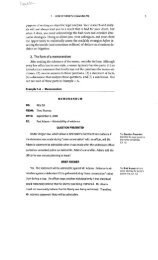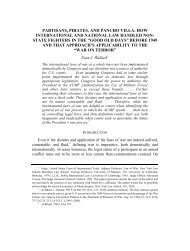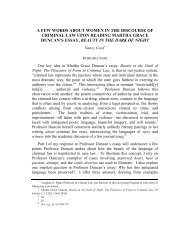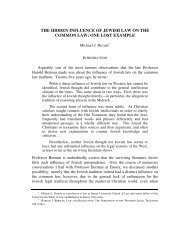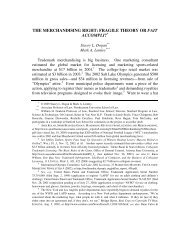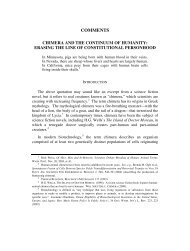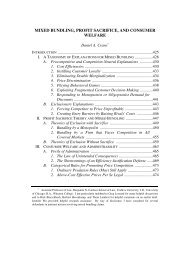life, liberty, and the pursuit of swords and armor - Emory University ...
life, liberty, and the pursuit of swords and armor - Emory University ...
life, liberty, and the pursuit of swords and armor - Emory University ...
You also want an ePaper? Increase the reach of your titles
YUMPU automatically turns print PDFs into web optimized ePapers that Google loves.
1314 EMORY LAW JOURNAL [Vol. 57<br />
statutes that include computer code <strong>and</strong> o<strong>the</strong>r forms <strong>of</strong> intangible property<br />
within <strong>the</strong>ir definition <strong>of</strong> property that can be stolen.<br />
4. Defining Virtual Goods as Property Through Custom <strong>and</strong> Practice<br />
Scholars disagree, however, on whe<strong>the</strong>r custom <strong>and</strong> practice requires<br />
defining virtual goods as protectable property. Specifically, one might argue<br />
that not everything that is <strong>of</strong> value can be protected against <strong>the</strong>ft. Thus,<br />
although a child can be stolen away from his parents <strong>and</strong> one’s sense <strong>of</strong> safety<br />
can be stolen by terrorists (both <strong>of</strong> which have value), nei<strong>the</strong>r <strong>the</strong> child nor<br />
one’s sense <strong>of</strong> safety can be classified as <strong>the</strong> sort <strong>of</strong> property that is protected<br />
by <strong>the</strong>ft statutes. 104 Although that is a valid point in those instances, virtual<br />
goods are produced specifically for use, whereas children <strong>and</strong> safety are not.<br />
Thus, many scholars argue that <strong>the</strong>ft protects only that which is<br />
“commodifiable”—that is, <strong>the</strong> thing stolen must be <strong>the</strong> sort <strong>of</strong> thing that can be<br />
bought or sold. 105 Yet, even under this modified definition <strong>of</strong> property, virtual<br />
goods within MMORPGs should still be considered property because virtual<br />
goods are bought <strong>and</strong> sold through auction <strong>and</strong> Internet sites.<br />
Still, one might claim that “<strong>the</strong> criminal law forum is an inadequate one in<br />
which to consider <strong>the</strong> policy implications <strong>of</strong> creating property rights in<br />
information,” because intangible property is amorphous. 106 In o<strong>the</strong>r words,<br />
because intangible property cannot be classified as a chattel, it should not be<br />
subject to property protection. 107 Using an example in which a neighbor copies<br />
a recipe, one scholar contends that intangible property should not be subject to<br />
criminal <strong>the</strong>ft statutes because (1) <strong>the</strong>ft <strong>of</strong> intangible property does not deny<br />
<strong>the</strong> plaintiff <strong>the</strong> right to possess, use, <strong>and</strong> enjoy <strong>the</strong> res—that is, although <strong>the</strong><br />
plaintiff may lose her exclusive right, she may still continue to use <strong>the</strong> recipe,<br />
<strong>and</strong> may even sell <strong>the</strong> recipe, though at a lower value; <strong>and</strong> (2) <strong>the</strong>ft <strong>of</strong><br />
intangible property only causes damage to <strong>the</strong> value <strong>of</strong> <strong>the</strong> property but does<br />
not deny <strong>the</strong> plaintiff actual possession <strong>and</strong> use <strong>of</strong> <strong>the</strong> property. 108<br />
104 Green, supra note 100, at 216. Stealing a child from his parents is prohibited under kidnapping, a<br />
different statute. See 18 U.S.C. §§ 1201, 1203 (2006).<br />
105 Green, supra note 100, at 217.<br />
106 Geraldine Szott Moohr, Federal Criminal Fraud <strong>and</strong> <strong>the</strong> Development <strong>of</strong> Intangible Property Rights in<br />
Information, 2000 U. ILL. L. REV. 683, 686.<br />
107 Id.; see also BLACK’S LAW DICTIONARY 251 (8th ed. 2004) (defining chattel as “[m]ovable or<br />
transferable property; personal property”).<br />
108 Moohr, supra note 106, at 692–93.



